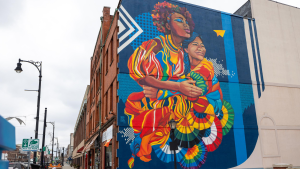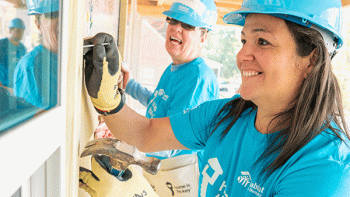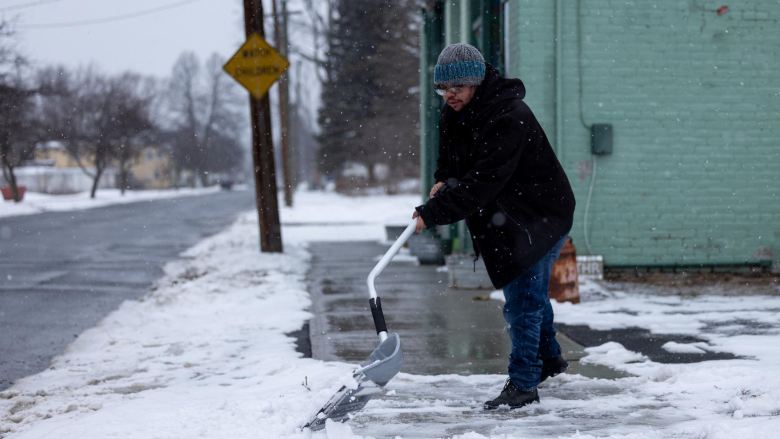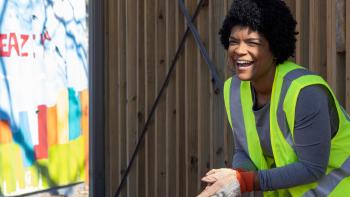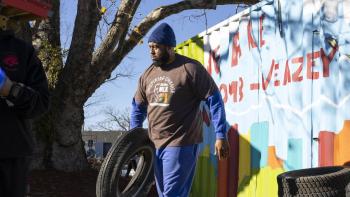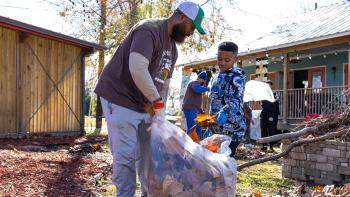Remembering President Jimmy Carter
We invite you to join us in remembering President Carter’s remarkable legacy. Share how you’ve been inspired by President Carter’s life and service and read others’ stories in our memory book.
A gift of time and talent: Building community through volunteering
For John Rhoden, volunteering is a way to help build community. His roofing company donates its labor to help ensure that Habitat for Humanity homes in Wichita, Kansas, are equipped with strong, durable roofs.
For John Rhoden, volunteering is a way to help build community. His roofing company donates its labor to help ensure that Habitat for Humanity homes in Wichita, Kansas, are equipped with strong, durable roofs. “We think back to those in the community that serve us so well throughout the year, and we want to pay it forward,” John says.
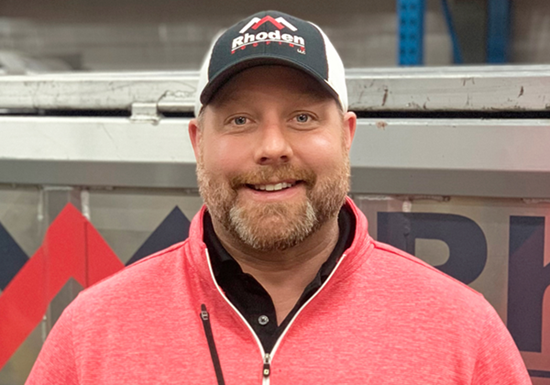
John Rhoden, owner of Rhoden Roofing
Making a difference through service
Rhoden Roofing volunteers through the GAF Community Contractor Program with Wichita Habitat, helping to keep homes more affordable.
“As we all know, there’s a rising cost in materials,” says Danielle Johnson, Wichita Habitat’s executive director. “Being able to work alongside GAF really helps lower the cost of the roof.”
In the program, contractors donate their labor by installing roofs built with materials donated by GAF, a Standard Industries company and the largest roofing and waterproofing manufacturer in North America.
Because the donated roofs are installed by GAF Master Elite or Certified contractors, they come with a GAF System Plus, Ltd. warranty that includes a lifetime guarantee on shingles and a 50-year warranty on the installation.
“We think back to those in the community that serve us so well throughout the year, and we want to pay it forward.”— John Rhoden, owner of Rhoden Roofing
“GAF has been thrilled to partner with Habitat to help build safe and resilient homes,” says Jeff Terry, vice president of corporate social responsibility & sustainability at GAF. “Through donations of GAF products and the help of our incredible network of contractors like Rhoden Roofing, who so generously donate their construction labor, we hope to help ensure even more families experience the joy and security of having an affordable home.”
Since the inception of the partnership in 2011, GAF has donated more than 3,500 roofing systems to Habitat affiliates across the U.S., impacting more than 14,000 individuals.
This collaboration is part of GAF’s social impact initiative, GAF Community Matters, which is focused on making a positive difference as neighbors and partners in the community by leveraging roofing expertise, resources and products to help build resilient communities.
A bright new beginning
“I think it’s important for anybody to volunteer,” John says. “But I think it’s especially important for people with skills like roofing, plumbing, HVAC or guttering to help build safer homes.”
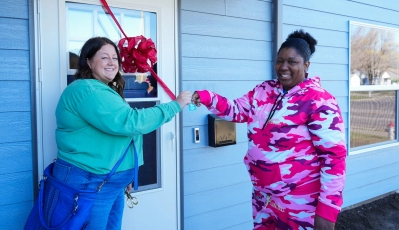
Maya (right) receives the keys to the Habitat home she helped build.
So far, Rhoden Roofing has installed 28 roofs with Habitat Wichita, including Maya’s. Prior to moving into her Habitat home, the mother of seven had to keep buckets around her rental to catch leaking water. The roof was “falling apart.”
Maya helped build her Habitat home and was excited to see Rhoden Roofing install the roof. “Watching them put the roof on was very emotional,” she says.
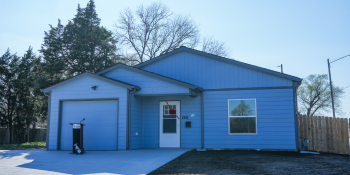
A gift of time and talent: Building community through volunteering
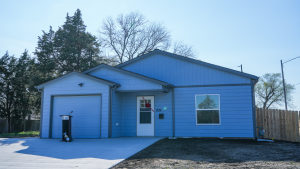
State Farm and Habitat for Humanity International continue national partnership
Habitat and residents forge legacy of change in Massachusetts community
Central Berkshire Habitat for Humanity is partnering with residents and local organizations to improve the quality of life in a historically marginalized neighborhood in Massachusetts. Learn how listening to residents, hiring them, and centering their voices has been key to driving improvements.
Central Berkshire Habitat for Humanity is partnering with residents and local organizations to improve the quality of life in Westside, a historically marginalized and disinvested neighborhood in Pittsfield, Massachusetts. Westside faces high unemployment, low homeownership rates, an aging housing stock and a lack of communal green spaces.
In 2009, Central Berkshire Habitat engaged residents and partners to jointly implement a holistic, community-centered neighborhood revitalization approach to spark changes in the community. Carolyn Valli, Central Berkshire Habitat’s CEO, says listening to residents, hiring them, and centering their hopes and dreams for the neighborhood has been key to driving improvements.
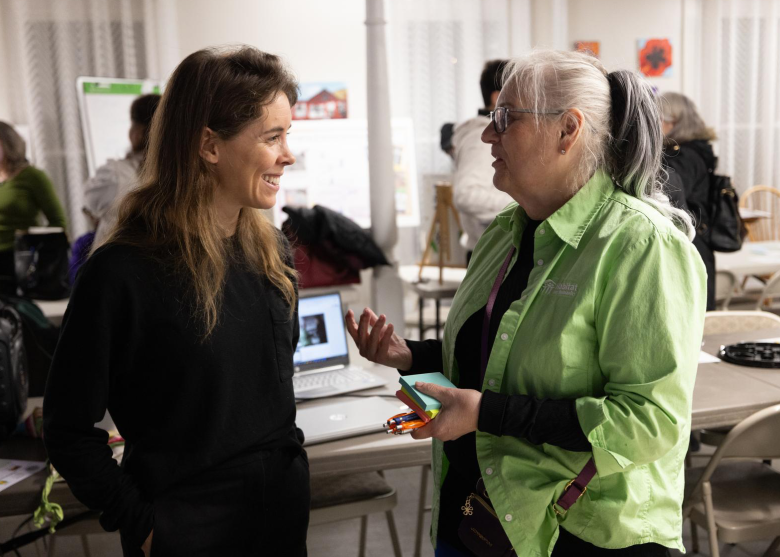
Central Berkshire Habitat CEO Carolyn Valli, right, with architect and Pittsfield resident Tessa Kelly.
“Residents are at the table. They are not an afterthought. They play a major part in making decisions and finding solutions.”— Carolyn Valli, Central Berkshire Habitat’s CEO
The Habitat-led coalition of residents and local partners have come together to:
- Create a workforce development program that trains future homebuilders.
- Build more affordable, decent homes and encourage other affordable home developers to invest and build in the neighborhood.
- Improve public safety by expanding the hours that social workers are on call to support police calls.
- Develop new parks and improve existing parks.
- Advocate successfully for new, safe sidewalks.
- Create murals that reflect the residents’ vision for the future of their community.
Connecting residents to resources
After hearing from residents that community members struggle to connect with local services, Central Berkshire Habitat hired two community navigators, local people with lived experience and cultural responsiveness who can help residents understand and navigate complex systems to reduce barriers to access. Community navigators and residents partnered to find affordable housing options and access food assistance and mental health resources.
Central Berkshire Habitat built on the immediate success of the model and hired additional community navigators. Now, six full-time community navigators speaking three languages — English, French and Spanish — partner with Westside residents as they navigate complex systems and access critical services.
“A lot of community members gave up trying to search for resources or seek out help because they felt they were fighting against a wall,” says Tonya Frazier, Central Berkshire Habitat’s lead community navigator.
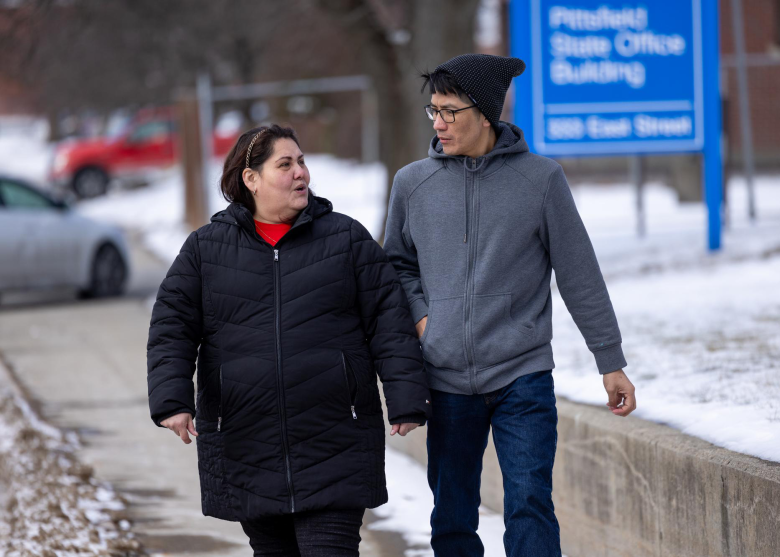
Maria Menaca, one of the community navigators at Central Berkshire Habitat, accompanies Jose to the DMV to take a driving test. Navigating local bureaucracies can be difficult for non-English speaking residents. Community navigators can translate in important settings such as this.
“We’ve seen a complete shift from people feeling very shut off to people asking for help and searching for resources.”— Tonya Frazier, Central Berkshire Habitat’s lead community navigator
Habitat’s community navigator model has spread throughout Pittsfield, with more than 40 agencies and local organizations employing their own versions of community navigators.
Strengthening the community through resident-led revitalization
Residents are encouraged by the progress they’ve seen in the neighborhood and the way the community has rallied together to improve the quality of life in Westside. “It makes me shed happy tears to see the change that Habitat and the residents have brought to this community,” says Tonya, who lives in Westside with her husband and children. “It gives you an extra bounce in your step to be in the Westside.”
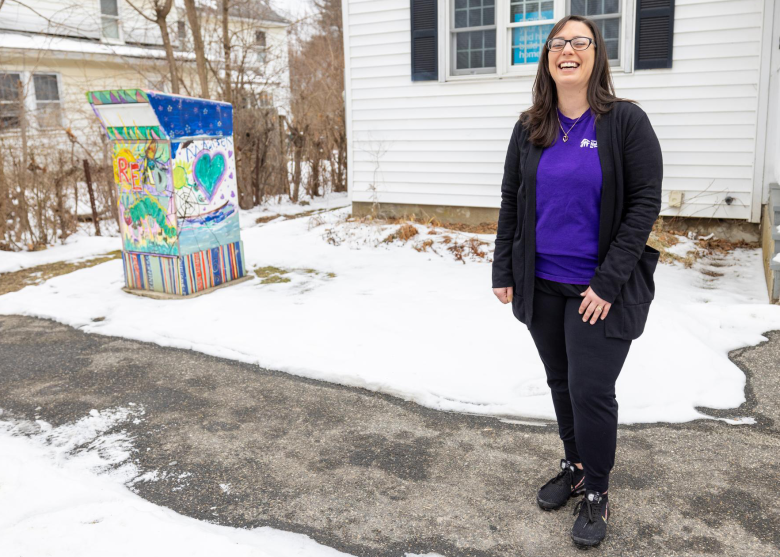
Tonya Frazier poses for a portrait next to the little book library on Columbus Ave.
In Westside and communities across the U.S., Habitat affiliates are partnering with residents to implement neighborhood revitalization projects and inspire lasting community-wide change. “We’re considered community developers now,” Carolyn says. “At the end of the day, that’s the legacy we want to have. It’s about how we have helped change the entire community based on what the community wants.”
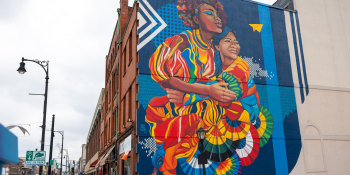
Habitat and residents forge legacy of change in Massachusetts community
